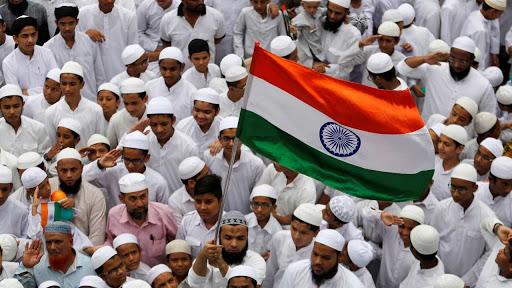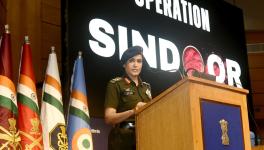Muslim Politics beyond Islamophobia

Representational image. | Image Courtesy: First Post
The organised hate campaign against the Muslims has assumed ominous proportions across the globe, but more so in India. Even a wretched event, the Coronavirus pandemic, was used as an occasion to spread misinformation on how Muslims are responsible for wantonly spreading the virus. Modern democracies that are based on the majority-minority divisions seem to be susceptible to this kind of majoritarian mobilisation; and constitutional morality and legal-rational provisions do not match up to the passion generated by muscular imagination of majoritarianism.
Majoritarianism is a certain kind of moral imagination that influences social, political and even economic dimensions of everyday life. One needs to deflate the moral potency of this imagination if one wishes to defeat it. This can be done not merely by a secular-liberal elite or political parties that are attempting to quietly accommodate the Muslims. It has to be done essentially by an alternative kind of Muslim politics in India.
Political and social narratives of Muslims have failed to counter the moral potency of the majoritarian discourse because they have been working within the limits of a legal-Constitutional frame; making feeble appeals to constitutional provisions, highlighting the violations of legal provisions, and so on. This cannot work so long as moral potency is on the side which convinces the majority that it is doing the right thing in order to ward off a potential wrongdoing or threat to their very survival.
In lieu of this, at a political plane, Muslim politics works within the terms of discourse set by the majoritarian discourse. It merely appeals to growing Islamophobia, which is precisely what the majoritarian mobilisation claims to do. When majoritarian mobilisation is making a claim to a phobia, merely reiterating that ‘there is an Islamophobia’ makes very little sense to the majority community. By using the same frame that works the majoritarian mobilisation, Muslim politics has got caught in a circular imagination with no popular appeal beyond their own community and a miniscule minority of already-converted secular-liberal ‘Hindus’. The point, however, is to appeal to those ‘Hindus’ who are convinced by the campaign lead by majoritarian mobilisation.
Muslim organisations and individuals active in the public sphere have attempted to counter the factual incorrectness of various kinds of information floating around; much of which is consciously floated. This however does not work without an accompanying moral story. What needs to be countered is the moral vision behind the fake news, not just fake news.
Cultural tropes are not subjected to scientific scrutiny and will not be discarded if falsified by more authentic information. In fact, authenticity of the information is itself judged through a cultural lens. What needs to be attempted is to shift the cultural lens. Authentic and correct information will work only if the underlying cultural story is challenged or provoked to be rethought in a way that its moral potency is tapered off. Mere evidence, however scientific or correct or valid, without negotiating the constructed public morality will not only fail but further strengthen the majoritarian anxiety.
Muslim politics that is caught within the confines of a global discourse of Islamophobia has produced a blinkered vision without local cultural and historical specificities. It is offering an abstract moral vision of minority rights, without connecting to the cultural tropes of a prevalent public morality.
It is true that the majority has more resources, numbers and institutional proximity, but that cannot assure majoritarianism as a moral vision. What makes majoritarian mobilisation possible is that it deploys the available resources to create a powerful moral story that makes it difficult for the majority community to believe that what they are doing is morally wrong. By far Muslim politics has rarely, if ever, spoken to the majority or attempted to understand where these anxieties come from and why they sharpened over the last decade or so.
The dynamics of representative democracy has disallowed this kind of dialogue and this has led to consolidation in number-terms, which is what is witnessed in the demographic anxieties of both communities. Muslims are too large in number in India to create anxiety among the Hindus and too small a number to not feel like a minority. This kind of a hyphenated and precarious context augments a potential conflict, given the history and memory of Partition. These are sociological realities that work in the cultural symbolism of the right-wing mobilisation. Apart from the fact that Muslims were ruling elites in many parts of North India and also South India, it is also possible to ascribe the atrocities committed by ruling elites in the course of their rule to their religious identities.
An abstract counter-narrative centred on Islamophobia cannot ground itself in these socio-historical realities. A counter-narrative has to offer an alternative way to imagine these realities without glossing over the potential context for conflict. An abstract and vague normative appeal cannot work in the context of heightened polarisation and anxiety, but a careful redrawing of cultural symbolism around those sociological realities that could have solidified in popular memory can. This has not happened because secular-liberal politics rarely thinks through the lens of popular appeal and Muslim politics was always constrained from making such an attempt.
Today we need a performative Muslim politics that can create a popular counter-narrative of who they are and what Islam stands for. For many secular-minded this might sound as if one is already accepting the higher moral ground of the majority community or that the Muslims might question why the moral burden to appeal to the majority community is being placed on them. These are valid normative questions but real-time politics is messy and operates in the popular domain through symbols, narratives and memories. These normative concerns could well become more of a hindrance than a method that can provide new possibilities.
Majoritarian mobilisation in India partly understands this today because they know how the current majoritarian morality has been constructed over a period of time. It is also based on a politics that can ward off a counter-narrative that questions its moral potency, by establishing an ethic of majoritarian righteousness, even if it means mass violence. Yet, this majoritarian moral vision was not given, but constructed—which is what allows for a counter-narrative too.
The author is associate professor, Centre for Political Studies, JNU. His edited volume, Secular Sectarianism: Limits of Subaltern Politics, was published recently. The views are personal.
Get the latest reports & analysis with people's perspective on Protests, movements & deep analytical videos, discussions of the current affairs in your Telegram app. Subscribe to NewsClick's Telegram channel & get Real-Time updates on stories, as they get published on our website.
























